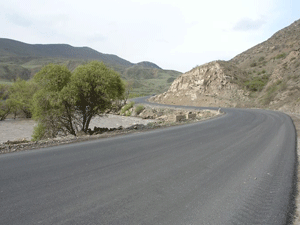Molly Corso, eurasianet.org
The Georgian government is applauding the Millennium Challenge Corporation, one of the most influential US foreign aid agencies, for giving Tbilisi a chance to obtain a second, five-year grant. While assistance levels and development priorities for the new grant have not yet been finalized, Georgian officials are expressing interest in improving the country’s educational and transportation infrastructure.
The MCC announced its decision January 5. The funding level for the new MCC compact -- which would be administered by its Tbilisi-based affiliate, the Millennium Challenge Georgia (MCG) – will be determined at a later date, once Tbilisi presents a comprehensive development blueprint. In April, Georgia will complete the programs tied to its first, $395.3-million set of grants, or “compact,” started in 2006.
Countries are selected for additional grants -- called “compacts” by the MCC -- according to three main requirements: their success at completing the first compact, their scores on reforms, and the availability of funds. Ghana was also named as eligible for a second compact.
Tamar Kovziridze, the top foreign economic aide to Prime Minister Nika Gilauri, called the MCC board of directors’ renewal decision “a demonstration of very strong political” and economic support for Georgia.
“It is rare for a country to receive a second compact. That makes it something very special,” Kovziridze said, noting that Secretary of State Hilary Clinton sits on the MCC board of directors.
MCC Resident Country Director Jim McNicholas stressed that a second MCC compact for Georgia would be based on Tbilisi’s ability to meet set criteria for democratic and economic reforms and investment; and not be based on geopolitical considerations.
A second MCC compact, which must receive US congressional approval, also depends on Georgia’s proposal for programs, and would not be allocated until Georgia completes a lengthyreview process. The Georgian government has not yet completed its proposal for MCC funding, but has indicated that education and transportation infrastructure would be among its main development targets.
The potential funding would come on top of the US government’s $1 billion assistance pledge, made in the aftermath of Georgia’s 2008 war with Russia.
Georgia relies on foreign aid and donor support to balance its budget and to pay for infrastructure and development projects. In 2011, the government anticipates over $877 million in financial aid from donors and foreign governments.
Some members of a local non-governmental-organization coalition that monitors both the MCC and MCG describe the MCC news as only a relative success for Tbilisi. “The MCC and Georgian government might think that this is a reward because they compare it to worse countries and not the best ones,” commented Irina Lashkhi, a program coordinator with the Open Society Georgia Foundation, which finances the coalition. [Editor’s Note: The Open Society Georgia Foundation is affiliated with the Open Society Foundations (OSF) in New York. EurasiaNet.org operates under OSF’s auspices].
Georgia was evaluated among “Lower Middle Income” countries, a 31-member category that also includes Angola, Iraq and Sri Lanka. In its annual scorecard, the MCC gave Georgia failing marks on several criteria, including political rights and fiscal policy.
Casey Dunning, an analyst at Washington, DC’s Center for Global Development, which studies the MCC and its compacts, noted that the score is a reflection of Georgia’s standing compared to its peer group of countries, not of its policy failures. “The grade is not a reflection of policy deterioration, but just a completely different group of countries that it is graded against,” Dunning said.
“Georgia has indeed been a success story for the MCC, but the board has made very clear that a second compact is contingent upon successful completion of Georgia’s first compact,” Dunning said in an email interview.
The government used money from the first MCC grant to build over 200 kilometers of roads in the southeast region of Samtskhe-Javakheti, and to repair the country’s strategic North-South gas pipeline, among other projects. “We are substantially satisfied that they have implemented the compact well and we are expecting that the compact will achieve the impact we are looking for and that Georgia predicted,” the MCC’s McNicholas said.
Lashkhi and other NGO activists, however, say they have lingering questions about the transparency of the grants and MCC/MCG’s commitment to allow public input for the second compact. MCC Chief Executive Officer Daniel W. Yohannes ended up not meeting with local NGO representatives during a visit to Georgia last October, Lashki noted. MCC Country Director McNicholas told EurasiaNet.org that Yohannes encountered delays during a trip to monitor projects in the field and, was unable to reschedule a missed meeting with NGO leaders.
McNicholas and MCG head Giorgi Abdushelishvili both maintained that their offices operate in a transparent manner and encourage relationships with NGOs. “We are very, very open to everybody,” Abdushelishvili said. “We always want them [NGOs] on board. … They must be on board. I cannot even imagine how I can be more transparent.”
The chair of the board of Transparency International Georgia, the local branch of the international anti-corruption watchdog, did manage to meet with Yohannes during his visit and said that he was “persuaded” that the agency values NGO input. “"I was persuaded that at least MCC sees the value of NGO input and we are not viewed as some pain that you have to deal with,” said Mark Mullen, a longtime observer of the MCC program. “We'll see how it is included in the compact."
photo: www.georoad.ge
http://foreignpress.ge/?p=16200
http://www.eurasianet.org/node/62684




